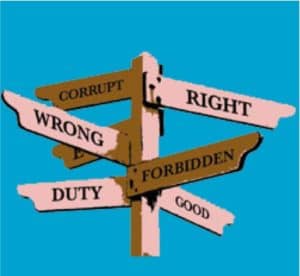Morality. Absolute or Relative
Update Dec 4, 2024. Added Fundamental Error of Attribution to the discussion.
Surprisingly, both relative and absolute moralities are at work within us.
Morality shows itself by its effect on our decisions, on our behavioral choices.

Personal Morality
Each person develops a personal morality that is based on their biological inheritance (3S Imperatives–Satiety, Safety, Sex) united with their personal experience. Personal morality is idiosyncratic (relative) and descriptive. Your personal morality is a description of how you rate the morality of actions rather than a demand that you act on your nature.
The Lawrence Kohlberg’s idea that personal morality changes as we age explains the progression we experience.
- First, as an infant, an act’s morality can only be pleasurable or unpleasant (good or bad). That is, satisfying our bodily requirements is the only functioning part of our decision-making in infancy.
- Between ages 3-7, we start to form long-term memories. With recall of past events and past consequences, we begin to develop a sense of our continuity and a desire to maintain it. In the nuclear family, our personal choices confront the family morality, where decisions are rewarded or punished. That is, a new standard of morality is enforced by power.
- With puberty, expanded experiences and sexual consequences arise in prominence for decision-making. As we experience life outside the house, we see that our understanding of right or wrong (good or bad) is not the only view. Others can see things differently.
- In school, we start to evaluate good and bad according to logic. Are the rules consistent morally? Are the rules applied to all? What are the exceptions?
- We apply our morality assessment of other’s choices although weighted by the relative closeness of the person to us (see Natural Social Groups), as expressed by the Fundamental Theory of Attribution. That is, the important of situational factors leading to another’s decision is less important the more distance they are from us.
- It isn’t until late 20s that our executive control of our rawer desires completes. In adulthood, the comparison of the society’s morality with our individual beliefs often disturbs our moral equilibrium.
Society’s Morality
Society’s morality is the summation of personal moralities of important people in the society’s past. It is nearly absolute. Prominent individuals, mainly long ago, infused a part of their personal morality on a wider group. The success of their morality legacy resulted in those moral decisions embedded in society norms. Great religious and spiritual leaders like Solomon, Jesus, Martin Luther, Gandhi, and Martin Luther King are one thread. In the political world, Hammurabi, Julius Caesar, and Napoleon are a few examples whose view of morality have shaped our world’s morality.
Once made, their contributions become hardened into the 10 Commandments or jurisprudence or social norms. It becomes an absolute standard that is either met or failed to be met.
Everyone in a society is bound its moral dimensions. These moral boundaries are conventions that continue or wither depending on their success in handling the moral dilemmas the society faces.
Various, conventional, absolute moralities exist, each having their own method of enforcing their moralities.
- Government uses laws and police to compel people to act according to a written moral code.
- Cultures often use myths and stories to capture the preferred moral decisions, with shunning and ostracism to keep members in line.
- Religions use homilies and instructions combined with blame, guilt, and amends to convince adherents to the prescribed moral code.
Friction
How does one’s personal morality mesh with society’s morals? Most people abide by society’s morality or avoid detection; however, some can’t or won’t. And when there is a clash, it can be explosive, when neither the person nor society will give. Following are a few bullet points of friction.
- Life-and-Death. Dr. Kevorkian. Is it murder to assist someone who wants to commit suicide? Different states have different answers. They have different moralities.
- Marriage. Various states’ decisions had led to differences in marriages. Personal morality about marriage often clashes with societal rules.
- Contentious arguments on abortion issues dominated in my first philosophy class in 1970. That firestorm still rages. It is moral question, but some want to use their relative personal morals while others believe that an absolute moral decision exists for everyone. However, declaring that personhood at starts at conception would have far-reaching implications that could make stillborn births murders.
Contention
It’s essential to understand that there are relative and absolute moralities contending in our decision-making. Which shall rule—relative personal conscience or absolute societal dictates?
Considering that we are inherently subjected to a personal bias as exemplified by the Fundamental Theory of Attribution, is there a breakdown of moral choices that must be absolute and those can be relative? In broad strokes, murder is absolutely morally wrong and helping another is absolutely morally right. On the other hand, marriage is a personal moral decision as is how much effort you spend on helping others.
Related Posts
Can everybody be sensible, yet come to different conclusions?
Decision-Making Schematic
Natural Social Groups
Fundamental Theory of Attribution



One coworker held his religious morality above all, yet his personal responsibility also demanded that work demands must be met. In Happy Path (http://www.rhamill.com/writing/happy-path/) the immovable man meets an irresistible force.
On the morally weaker side, one fellow bragged to me that he often was called to fix a certain type of software problem. He decided rather than fix the root cause, he’d leave it for future congratulations of his wizardry.
Similarly, a guy in physical installation told me he placed the equipment so it’d get wet and periodically fail. It was an easy fix that he could work as a relaxing Friday afternoon job or, if finances required, good Saturday overtime.
Bob, i fodnative piece. How about a live example of a moral or ethical dilemna from your work experience? Thanks. MG